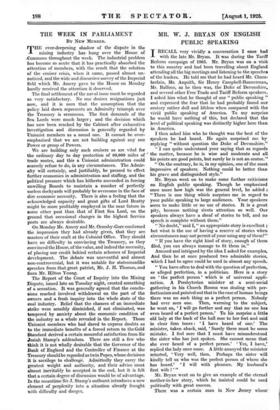THE WEEK IN PARLIAMENT BY NEW MEMBER.
THE ever-deepening shadow of the dispute in the mining industry has hung over the House of -Commons throughout the week. The industrial problem has become so acute that it has practically absorbed the attention of members, with the result that the solution of the cruiser crisis, when it came, passed almost un- noticed, and the wide and discursive survey of the Imperial field which Mr. Amery gave to the House on Monday hardly received the attention it deserved.
The final settlement of the naval issue must be regarded as very satisfactory. No one desires resignations just now, and it is seen that the assumption that the policy laid down represents an Admiralty triumph over the Treasury is erroneous. The first demands of the Sea Lords were much larger ; and the decision which has now been reached by the Cabinet after exhaustive investigation and discussion is generally regarded by Unionist members as a sound one. It cannot be over- emphasized that we are not building against any one Power or group of Powers.
We are building only such cruisers as are vital for the ordinary day to day protection of 80,000 miles of trade routes, and this a Unionist administration could scarcely refuse to do, in any circumstances. The Admir- alty will certainly, and justifiably, be pressed to effect further economies in administration and staffing, and the political pressure which has hitherto succeeded in forcing unwilling Boards to maintain a number of perfectly useless dockyards will probably be overcome in the face of dire economic necessity. There is also a feeling that the acknowledged capacity and great gifts of Lord Beatty might be more profitably employed in the near future in some other post than that of First Sea Lord, on the ground that occasional changes in the highest Service posts are always desirable.
On Monday Mr. Amery and Mr. Ormsby-Gore confirmed the impression they had already given, that they are masters of their craft at the Colonial Office. They should have no difficulty in convincing the Treasury, as they convinced the House, of the value, and indeed the necessity, of placing our credit behind certain schemes of Imperial development. The debate was uneventful and almost non-controversial, but it was notable for statesmanlike speeches from that great patriot, Mr. J. H. Thomas, and from Mr. Hilton Young.
The Report of the Court of Inquiry into the Mining Dispute, issued late on Tuesday night, created something of a sensation. It was generally agreed that the conclu- sions reached involved withdrawal on the part of the owners and a fresh inquiry into the whole state of the coal industry. Relief that the chances of an immediate strike were sensibly diminished, if not eliminated, was tempered by anxiety about the economic condition of the industry as a whole revealed in the Report. Those Unionist members who had dared to express doubts as to the immediate benefits of a forced return to the Gold Standard derived a certain mournful satisfaction from Sir Josiah Stamp's addendum. There are still a few who think it is not wholly desirable that the Governor of the Bank of England and the Controller of Finance at the Treasury should be regarded as twin Popes, whose decisions it is sacrilege to challenie: Admittedly they carry the greatest weight and authority; and their advice must almost inevitably be accented in the end, but it is felt that a certain degree of discussion would be of advantage. In the meantime Sir J. Stamp's outburst introduces a new element of perplexity into a situation already fraught with difficulty and danger.






































 Previous page
Previous page